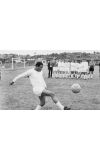
29 Dec 2012 21:23:10
On 1 May 1965, Albert Louis Johanneson lined up for Leeds United against Liverpool at Wembley, the first black player to play in an FA Cup final. Some of his teammates – Billy Bremner, Jack Charlton, Norman Hunter and the rest – would become legends in the game, but the pacy South African left winger was hardly out of place. Bremner described him as "incredible … he would spin and leave defenders 10 yards behind in the blink of an eye." Sir Alf Ramsey, England's 1966 World Cup-winning manager, later said of him: "There was no comparable footballer of his type in Europe. Maybe George Best." However, 30 years after that cup final, the "Black Flash" was found dead in a tiny Leeds flat at the age of just 55, a lonely, forgotten, penniless alcoholic. Paul Harrison's attempts to find out why take him around the globe and into what he calls "the murky world of … Leeds's alcoholics, drug addicts and dangerous personalities". Along the way, he unearths a shocking story of racism in and around football, and of the hardships suffered by those who paved the way for the foreign players now gracing the English game.
Johanneson had it tougher than most. Growing up in South Africa's townships under apartheid in the 1940s and 50s meant segregation and police beatings. Being scouted for Leeds offered a better life, but it started to unravel as soon as he got off the plane, being called a "nigger" at Heathrow. In his youth, he'd found escape in sniffing benzine and running, reasoning that: "If you could run like the wind, you had more chance of escaping the oppressors." But apartheid left wounds that not even adoration by home fans and 200 appearances and 68 goals for one of Europe's bigger clubs could heal. "Sir, people will not want to read a book about Albert Johanneson," he told Harrison. "I am black. Sometimes people pat me on the back and tell me I'm a hero. I'm not a hero, I'm not very interesting at all."
On the contrary, Johanneson's unexpected eloquence – in interviews shortly before his death – informs the book's most powerful passages, along with some startling anecdotes: on one occasion the police had to escort Leeds's new midfield sensation out of an upmarket area of the city for his own safety after he was manhandled from a shop for being black.
That times have changed doesn't make this less uncomfortable reading, but the creeping bleakness is lightened by the author's clear affection for his subject and some humorous episodes. Bremner tells the African he can't play in his bare feet, and chucks him in the team bath with the rest of the players to demonstrate that he's one of them.
The late Scot is depicted as an inspirational captain who encouraged his teammate to answer abuse by playing even better; the "Black Flash" was a prodigiously gifted but sensitive individual who was simply overwhelmed by what was happening to him. By contrast, the club's revered manager Don Revie comes across as insensitive and unsympathetic. On that landmark cup final day, Johanneson is so upset by a journalist's reference to him as a "sambo" that he tells the manager he doesn't want to play. Revie is having none of it. Johanneson plays badly and feels he has let everybody down, and their relationship never recovers. As his appearances become rarer, he turns to the bottle, and his life begins to tailspin.
Harrison's book would have benefited from the testimony of surviving teammates and more details about his subject's 25 lost years beyond a marriage, two daughters, work washing dishes in a Chinese restaurant and ill-fated periods in rehab. However, the author's 1996 interview with Justin Fashanu – the game's first £1m black player and its only openly gay one, who killed himself in 1998 – provides telling insight into the game's lack of professional support for anyone seen as different. "I believe that … football let him down. They can all say that they tried, and subsidised him with financial support. But Albert wanted something that is free. Like me, he wanted to be treated as an equal." At last, this troubling but moving biography affords him that.

